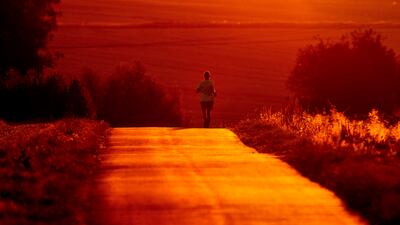Travellers from the Middle East who touched down at London’s Heathrow Airport this week were in for a shock. Fleeing the summer heat to Europe’s tamer climes has become something of a tradition for many families in the region. But at 1pm GMT on Tuesday, Heathrow’s weather station reported an all-time temperature high of 40ºC, one degree higher than the mercury in Abu Dhabi.
In countries like the UAE, Saudi Arabia and Iraq, 40ºC is about average for the end of July. In the UK, it is almost double the norm for this time of year. Elsewhere in Europe, particularly in Spain and France, this heatwave has brought wildfires of a scale unseen in 30 years. Portuguese officials have reported more than 1,000 heat-related deaths in the past week.
Perhaps the only people who have not been taken by surprise – though they have been no less distraught – are the world’s climate scientists. They have warned for years that the world’s global average temperature is only rising, and that extreme heat events will soon become a feature – not a bug – of life on Earth.
What is done cannot be undone, at least not without great difficulty; scientists have by now persuaded most governments and much of the general public that humans have damaged the planet’s atmosphere sufficiently that a return to a pre-industrial climate is probably not in the cards. But a course correction that preserves and, indeed, improves today’s climate to a significant extent remains possible. The devastation seen in Europe this week ought to provide a jolt to the global conscience that accelerates much-needed change to bring down carbon emissions. A number of countries, like the UAE and France, are already leading efforts to ensure a smart energy transition.
Clean energy is now cheaper than ever. More importantly, thanks to huge investment in the sector and sophisticated production processes for solar panels and wind turbines, it is cheap even in non-relative terms. Greater attention is also being given to hydrogen and nuclear power.
A much more difficult task – though it shouldn’t be – is investing in a more peaceful, stable world. Even before this week’s heatwave, Europeans were bracing for tough times ahead. Russia, which is under European sanctions, is a primary supplier of much of the continent’s natural gas. This month, several EU countries, as well as the UK, warned their citizens that ample energy supplies for the winter are far from assured in the absence of any diplomatic resolution to the Ukraine war. Thanks to unprecedented demand this month for air conditioning and cooling systems, the strain will be even greater.
Agriculture, too, is expected to suffer. “We are expecting to see major impacts on agriculture,” said Petteri Taalas, head of the World Meteorological Organisation, on Tuesday. “During previous heatwaves in Europe, we lost big parts of harvest.”
The world is already in the midst of a food crisis – exacerbated, again, by the war in Ukraine and growing desertification. A poor harvest in Europe will have knock-on effects across the world. All of this makes innovations in agri-tech more important than ever.
Tackling climate change is a big-picture problem. It requires a long-term perspective, mental stamina and patience for immediate sacrifices to bear fruit many years from now. In the intervening time, however, it throws the smaller picture – the damage caused by war, poor governance and persistent, widespread poverty – into sharp relief. The world must find a way to become more neighbourly, and do it quickly, because the next heatwave is inevitable. We must hope it hits a more peaceful, co-operative planet, rather than today’s crisis-ridden one.


